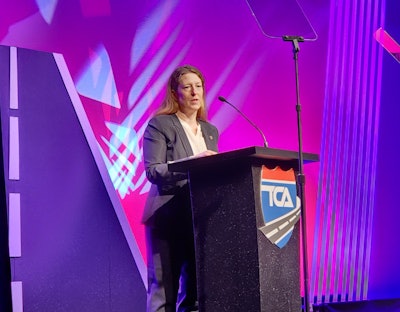
The Federal Motor Carrier Safety Administration is closing a loophole in its Drug and Alcohol Clearinghouse that makes it possible for a driver to have a drug or alcohol violation reported by another employer after a pre-employment query, but before the next annual one. The news came during FMCSA Administrator Robin Hutcheson’s address to members of the Truckload Carriers Association at the organization’s Truckload 2023 meeting in Orlando Tuesday.
“The Clearinghouse will very soon start notifying employers if there is a change to a driver’s clearinghouse record for up to 12 months following the query,” said Hutcheson.
The change takes effect later this month, and employers will be notified via email when a driver with a query has new information on his or her record.
Hutcheson also said FMCSA hears the calls for hair follicle testing and the agency is being as proactive as it can, but noted the Department of Transportation has to follow mandatory guidelines from the Department of Health and Human Services (HHS). The Department of Transportation, including FMCSA, is required to follow the HHS Mandatory Guidelines for technical and scientific issues related to testing for controlled substances and HHS has not yet issued final guidelines for hair testing. Hutcheson, however, said HHS now anticipates a revised proposed guidance will be available to the public this summer.

Reiterating the Department of Transportation’s goal of zero fatalities on the nation’s highways, Hutcheson said her administration is focused on creating safer drivers, safer vehicles and better roadways. She called on the trucking industry to help address the “root causes” of unsafe driving in and around commercial vehicles that result in almost 5,000 deaths per year, including 800 commercial driver fatalities.
“I cannot think of another place in the modern world that we would accept those kinds of numbers of people dying in the workplace,” she said.
Hutcheson pointed to prevention, training and technology as tools FMCSA will use to help carriers lower accident risk on the road. FMCSA is working with the National Highway Traffic Safety Administration on a rule that would require automatic emergency braking on large trucks, and it has reintroduced a rulemaking to require speed limiters be turned on in the engine control units of large trucks that are already equipped with them. “These are critical technologies that we believe will save lives and true to the spirit of the national roadway safety strategy,” she said.
On the subject of truck parking, Hutcheson said there is no organization or group involved in trucking that hasn’t talked to the agency about the issue. “This is a critical issue and we hear you loud and clear,” she said. FMCSA has issued $81 million in high-priority grants toward projects like truck parking, including $37 million awarded to Florida and Tennessee last October.











